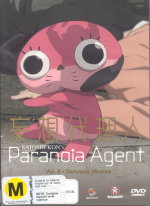
Released by: Madman Entertainment.
Region: Four.
Aspect Ratio: 16:9 (anamorphic)
Disc 1:
Returning from the wider focus of the previous three episodes we come back to Ikari and Maniwa as they adjust to their new positions in life. Ikari grapples with the injustice of it all - still feeling there has to be a simple explanation for all the attacks but he falters wondering if somehow he has failed to notice something important. Maniwa meanwhile has gone another route and is now fully immersed in the world of Little Slugger he begins to find clues and patterns all over the place that lead him closer to his quarry. But how real is anything he finds?
Of course Little Slugger hasn't been idle and his influence in the world continues to spread and grow as more people fall victim to his ministrations. This leads to a climactic confrontation with Tokyo itself in the balance as the reality behind Little Slugger is finally revealed.
It is a big stakes ending for the series which I suspect some will feel comes a little abruptly into the series. However when you consider that what episodes 8,9 & 10 were really telling us is just how far the legend and influence of Little Slugger has spread then it isn't really much of a surprise. In particular, for interpretting the ending, it is well worth remembering what Kozuka's story is. The storytelling focus that had diluted a bit in the previous volume comes back for the conclusion where all is revealed. In some ways the ending isn't actually suited for episodic television as a lot of what it shows us is a subjective visual interpretation of both the literal and the metaphorical. Often what we see isn't at all real but rather how a character views reality, we have been quite carefully prepared for this by earlier episodes but I must admit with the gap between volumes it took me a little time to get back into the swing of things and fully appreciate what was going on.
The other seeming flaw is the almost trivial source of the whole affair. It isn't till you sit back and realise that is precisely the point Satoshi is making to us, that a lot of the huge problems we face in life are created by the trivial deceptions we engage in - both with ourselves and others. It is a clever ending to a series that has remained very original for almost all of its run. Worth noting also is that viewers should stick around after the end credits as even the final episode has a 'Prophetic Visions' for the next episode. Something that is just so in keeping with the whole tenor of the series and also makes an important point that wraps the story up neatly.
To say that I have greatly enjoyed this series would be an understatement. If you can handle the subjective viewpoint storytelling engaged in then you are rewarded with a series that stands up well to repeat viewing as well as being, despite the destruction wrought in the finale, actually quite cheerful. On the technical side of matters we have the usual 2.0 stereo mix complimented by 16:9 anamorphic visuals. For the finale disc the sparsity of extras has finally been overcome with the provision of a commentary track for all three episodes on the volume. This track ranges in topic talking about story design, intent as well as shooting the breeze a bit with the odd joke between participants. Or indeed the very frequent joke between them. Talk is rapid and lively such that occasionally following the subtitles can be a bit tricky but it is well worth sitting through as a lot of care poured into the series is brought to the fore. It is an excellent extra to round out the final volume of the series with.
All in all this is one of those anime series that I generally think should be in at least every discerning anime collectors collection, if not every anime collection. It really is a wonderful and clever piece of work. The question now becomes, will we see more of Satoshi's work in series form or will he return to making feature length movies? After seeing this series I must admit to wanting to see more of what he can do with the longer time frame a series permits...